Newsletter: In Benjamin Benne’s ‘Alma,’ the cliché of the chancla gets a theatrical turn
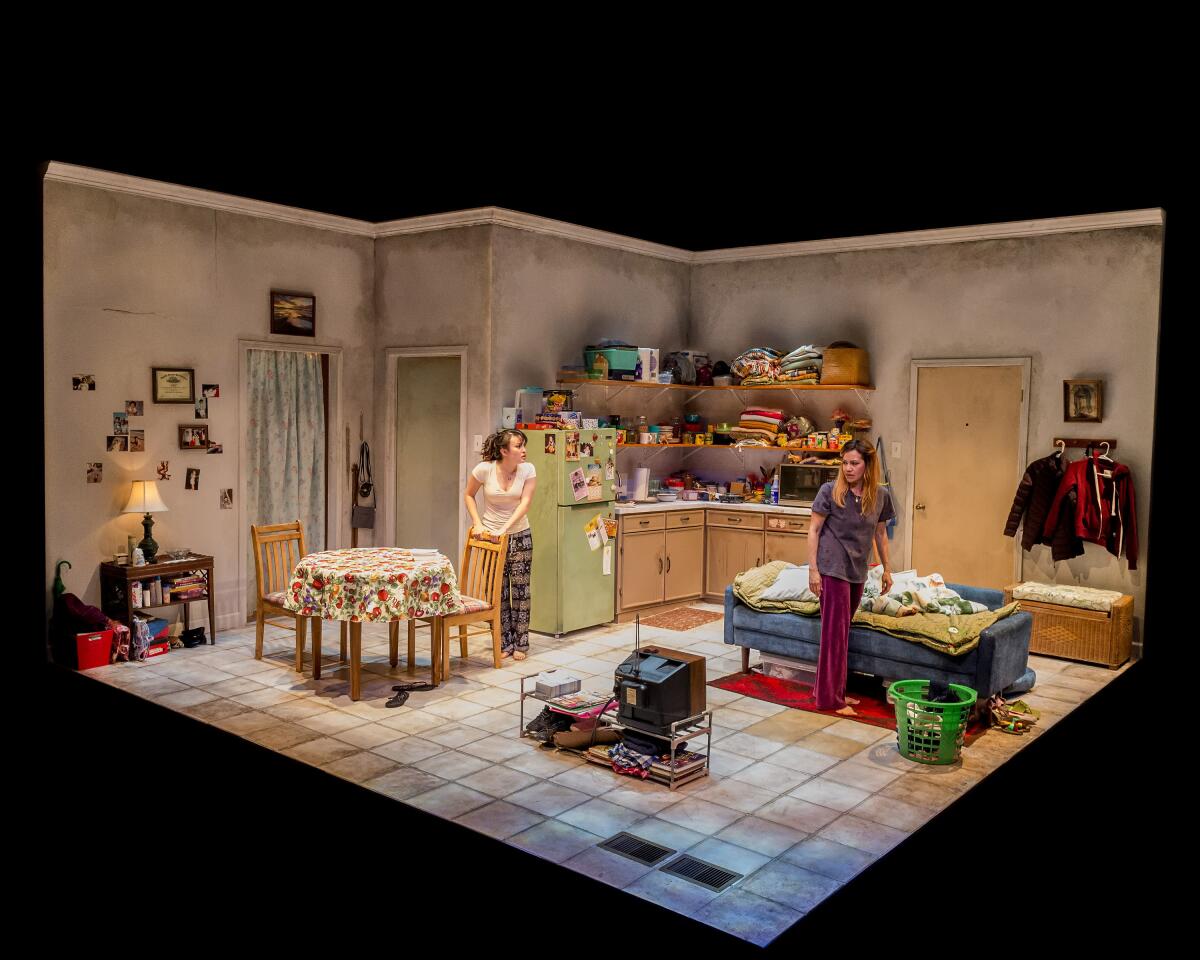
- Share via
San Francisco — I’m in San Francisco drinking pisco punch at ship-themed saloons like a sailor on shore leave. I may also be looking at the latest tech bro architecture and admiring the city’s world-famous leaning tower. I’m Carolina A. Miranda, arts and urban design columnist at the Los Angeles Times, and I’m here with the week’s essential culture news — and Korean election graphics.
Respect la chancla
It can be too easy to reach for la chancla. I’m talking about the flip-flop or slipper deployed as disciplinary tool on errant children that now serves as a trope of Latino parenthood. La chancla has materialized in joke T-shirts, in the Disney film “Coco” and in viral YouTube videos, such as “The Secret of La Chancla,” a faux documentary that explains the secret behind the good behavior of Latino children. These generally feature an angry mother wielding a chancla as if it were the Hammer of Thor.
Writing a story that you want to season with a signifier of the Latino? Throw in a chancla reference. Doing a comedy routine about Latinos? Chancla. Want to come up with a cute name for your brand that conveys Latina domesticity? Chancla.
It can be cute and funny. It can also be low-hanging fruit. It’d be nice if every once in a while a Latina could be seen whooping some ass with a copy of Architectural Digest. (For the record: My mom didn’t waste time with a chancla; she was a pincher.)
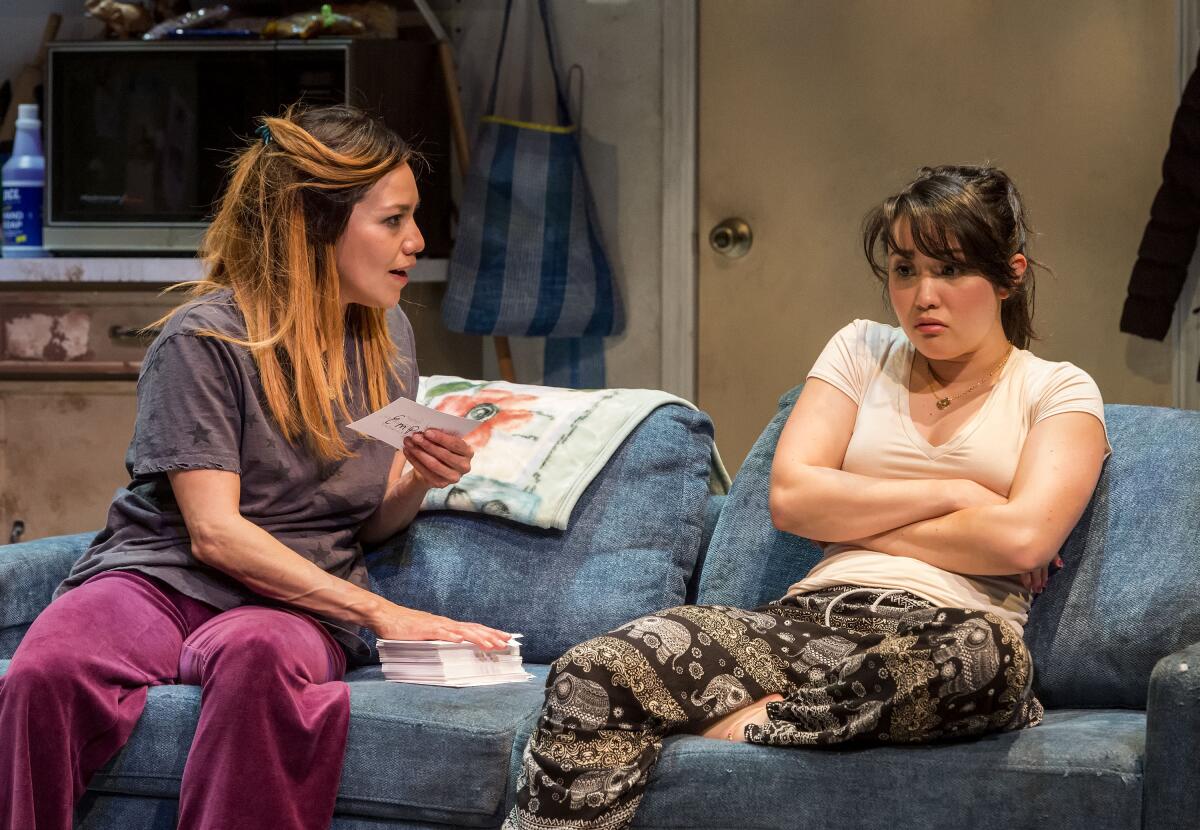
So when the character of Alma (played by Cheryl Umaña) reaches for a chancla in Benjamin Benne’s new play, “Alma,” which is having its world premiere at the Kirk Douglas Theatre, I waited for the inevitable chancla punchline to land like a ... well, chancla: all too obvious, with a dull thud to the head.
Except it didn’t.
Instead, the scene turned into a set piece of hilarious physicality, with Alma and her petulant daughter Angel (played with just the right whine by Sabrina Fest) fighting over the chancla in a physical struggle that devolves into a fusion of lucha libre and absurdist contemporary ballet. (Props to the choreographer.)
There are many moments like this in “Alma.”
The play takes on typical themes of U.S. Latino narratives: the story of an epic migration, of the struggles between the immigrant generation and the one that was born here, of the ways in which value systems born in Latin America are adapted to the U.S. experience, of the conflict between what a parent desires for a child versus what that child desires for themselves.
In Benne’s hands, these themes are never mere archetypes but part of flesh-and-blood characters full of ambivalence and contradiction, with great love for one another but also great frustration. There are moments of magic too: a television that comes to life as a mechanical Cassandra and curious happenings that serve as portents of the future this charming mother-daughter team face.
Make the most of L.A.
Get our guide to events and happenings in the SoCal arts scene. In your inbox every Monday and Friday morning.
You may occasionally receive promotional content from the Los Angeles Times.
Benne is originally from the Los Angeles area and has lived in the Midwest and the Pacific Northwest. He is young — just 34 and currently in the process of completing his master’s degree at the Yale School of Drama — but his work has already been produced in theaters around the country. “Alma” shows a writer in command of character and dialogue, not to mention metaphor: A conversation between Alma and Angel about a PBS nature special on African elephants provides not only an opportunity to consider the ways in which beings care for one another but also the ways in which they can close ranks to those who are not of their ilk. It is smartly and elegantly done.
The play is part of an initiative, led by award-winning playwright Luis Alfaro, who is serving as associate artistic director at the Center Theatre Group, to deploy the Kirk Douglas Theatre as a stage in support of L.A. voices.
I saw “Alma” on the first night of previews — the first public show held at the Douglas since the pandemic began two long years ago. The mood was ebullient. It also felt full of promise. “Alma” is certainly part of that. The voices on this stage had a lot to say. And I, for one, am looking forward to the conversation.
“Alma” premieres on Sunday at 6:30 p.m. at the Kirk Douglas Theatre and is on view through April 3. For tickets and other information, logon to centertheatregroup.org.
On and off the stage
At the heart of the Great Recession of 2008 was the bankruptcy of the financial services behemoth Lehman Brothers, a company whose massive scale belied its humble origins: Lehman Brothers began life as a dry good shops in Montgomery, Ala., in the mid-19th century. “The Lehman Trilogy,” which has landed at the Ahmanson Theatre after a Broadway run, charts the company’s rise from fabric peddling to global investment bank. The Sam Mendes-directed production doesn’t focus on the subprime mortgage crisis, reports Times theater critic Charles McNulty. “But ‘The Lehman Trilogy’ traces the perversion of an economic logic that went from generating astonishing family wealth to nearly capsizing the global economy.”
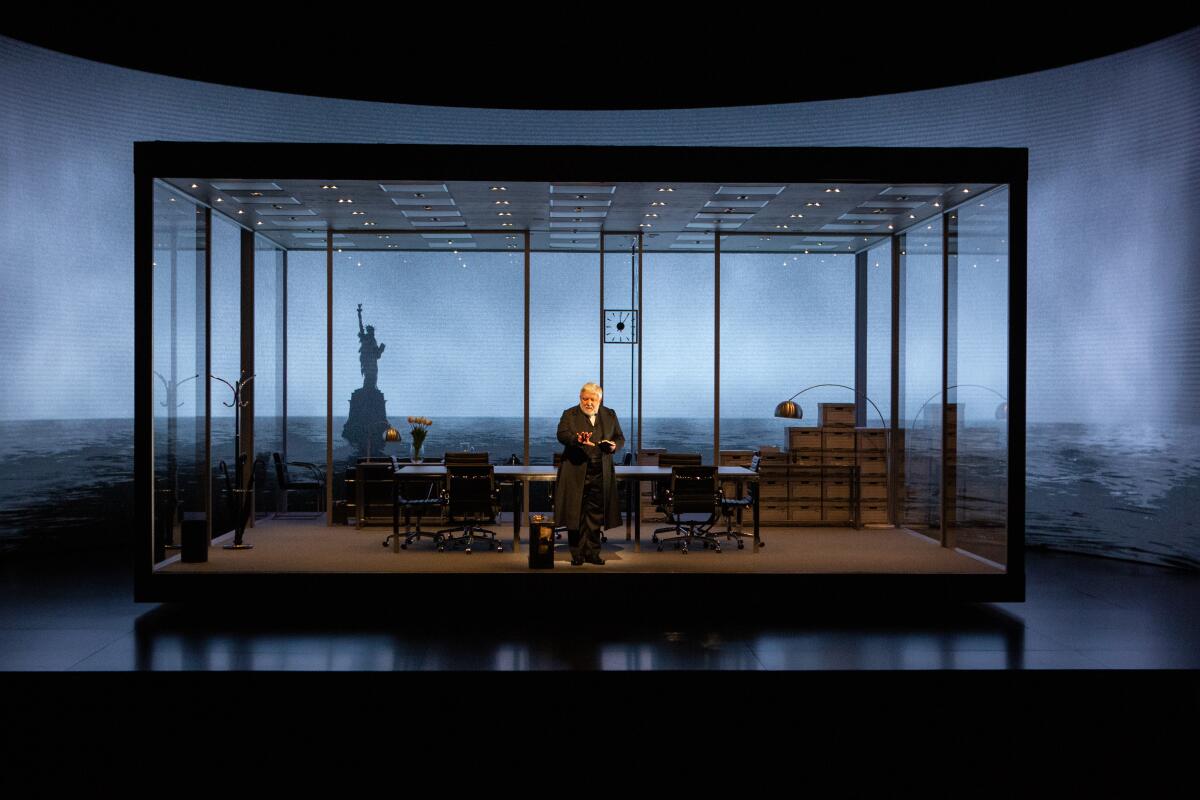
Also on McNulty’s docket is Pearl Cleage’s, “What I Learned in Paris,” inspired by the election of Maynard Jackson as Atlanta’s first Black mayor in 1973. The play, he writes, “dramatizes not so much the political obstacles to this watershed victory as the behind-the-scenes relationships that tell a messier human story.”
Plus, McNulty reviews actor Harvey Fierstein’s “scrumptious” new book, “I Was Better Last Night: A Memoir.” The book primarily covers his life and career in the wake of “Torch Song Trilogy,” the play that earned him two Tony Awards and turned him into a star. “He delivers plenty of dish, some of which leaves a bitter aftertaste,” writes McNulty. “But his writing is most alive in the early years, before he becomes a Broadway institution.”
The world premiere of “King James,” a co-production of Chicago’s Steppenwolf Theatre and L.A.’s Mark Taper Forum, was originally scheduled to open in May 2020. Two years and one pandemic later, Rajiv Joseph’s play — which revolves around the lives of two basketball fans and “the invisible presence” of LeBron James — is finally set to open in Chicago, followed by an opening in June in L.A. Contributor Lisa Fung caught a Chicago rehearsal, in which Tony Award-winning Kenny Leon walked actors through the steps. Glenn Davis, who plays one of the leads, says of the experience: “There’s so much shifting that’s gone on with this play, with us as individuals, with America, with how we have conversations about race and culture, and with LeBron himself.”
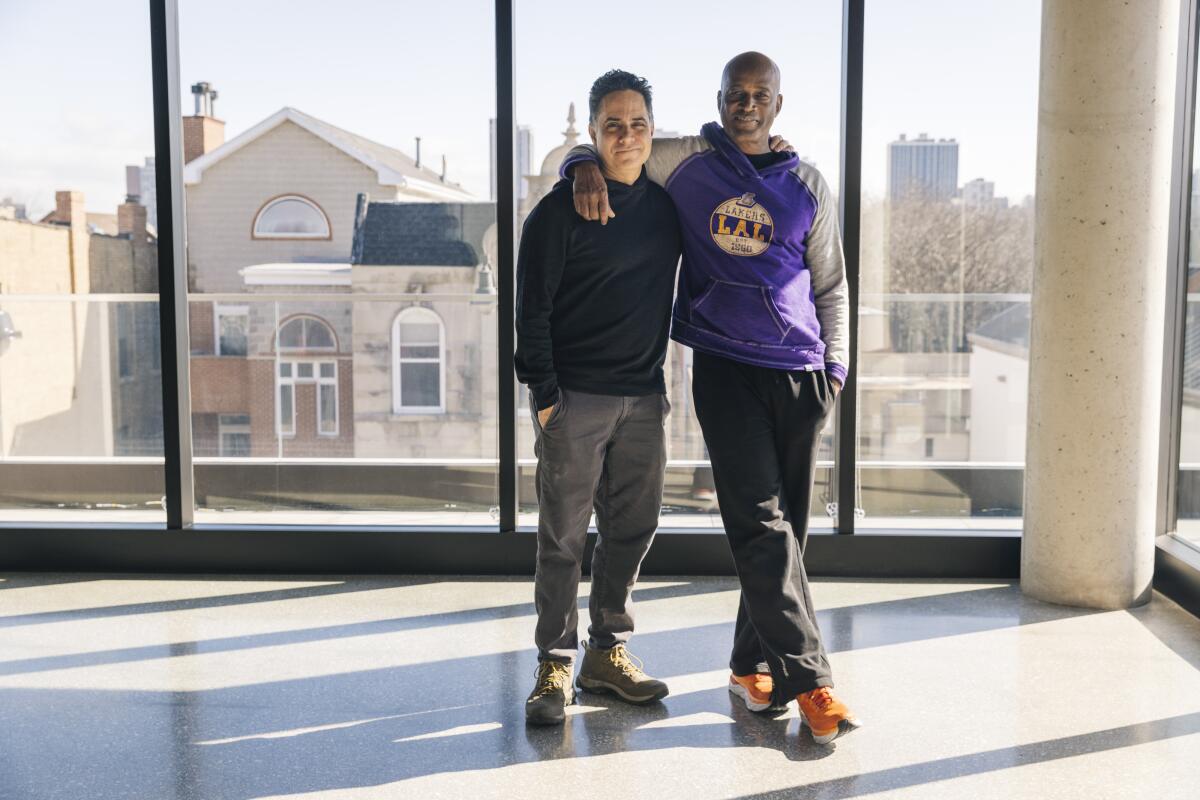
Mexican playwright Bernardo Cubría once had a play rejected from a festival because it didn’t feature any “Latinx themes.” Befuddled by the reason for the rejection — “I’m Mexican, so doesn’t that make anything I write Latinx?” — he wrote a play about it: “The Play You Want,” which tells the meta-comic story about a Latinx playwright who sarcastically pitches a narco-themed play titled “Narco-cocos” only to have it produced. And that play, as contributor Nikki Munoz writes, has now landed at the Road Theatre in North Hollywood.
Enjoying this newsletter? Consider subscribing to the Los Angeles Times
Your support helps us deliver the news that matters most. Become a subscriber.
One of my colleagues, film writer Mark Olsen, has an absolutely terrific interview with Broadway star Ariana DeBose about appearing in Steven Spielberg’s “West Side Story.” She talks about how Afro Latinos have been erased from Latino narratives, how she handled her audition with Spielberg and how she approaches a story about Puerto Rican New York that was originally conceived by three white men. A must-listen.
Ukraine and the arts
At the Andrey Sheptytsky National Museum in Lviv, Ukraine’s largest museum, the race has been on to protect the collection’s objects. AP journalist Bernat Armangué was on hand to capture that process.
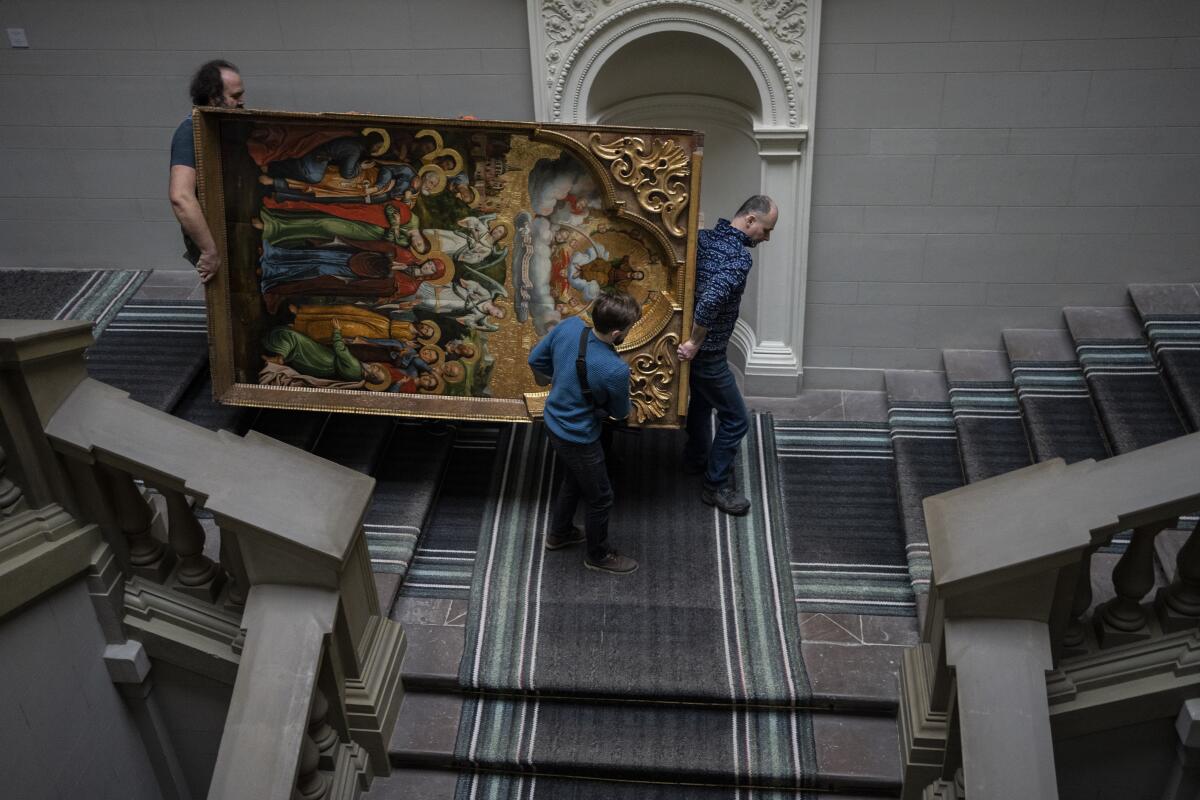
The Kyiv City Ballet happened to be in Paris for a residency at the Théâtre du Chatelet when the war broke out. Now they find themselves stranded in France. “We are both physically and emotionally exhausted,” Ekaterina Kozlova, the company’s deputy director, told the Associated Press.
The New York Times’ Alex Marshall reports on “Dogs of Europe,” a work by the Belarus Free Theater in London that imagines a dictatorial Russian superstate dominating half the continent. “As the war in Ukraine enters its third week, the Belarus Free Theater’s performance may seem accidentally timely,” he writes. “But it is only the company’s latest attempt in its 17-year existence to warn about rising authoritarianism in Eastern Europe.”
Across Ukraine, historic architecture is in danger of being reduced to rubble.
Demna, the creative director at Balenciaga, who once fled the republic of Georgia as a refugee, honored Ukrainian refugees in the fashion’s house’s latest runway spectacle in Paris. “It was an uncomfortable watch, and veered perilously close to using a humanitarian crisis as an aesthetic,” reports Guardian fashion writer Jess Cartner-Morley. “Yet it was also, for many in the audience, a humane and powerful show of empathy, an emotion not often seen on the catwalk.”
Visual arts
Ernest Rosenthal has led an incredible life: Born to a Jewish middle-class family in Vienna, he once hitchhiked to go see Picasso’s “Guernica,” fled Austria during the Nazi occupation, made it to L.A. where he was mentored by Swiss artist Hans Burkhardt, learned printmaking, traveled to Mexico, worked for June Wayne at the Tamarind Lithography Workshop and cultivated an absolutely riotous garden. All the while he painted — abstracted forms, some imbued with rich color — and those works are now on view at Last Projects. Rosenthal, decked out in an all-white ensemble and black cowboy boots, turned up at his opening on the day he turned 102. Contributor Matt Stromberg reports.
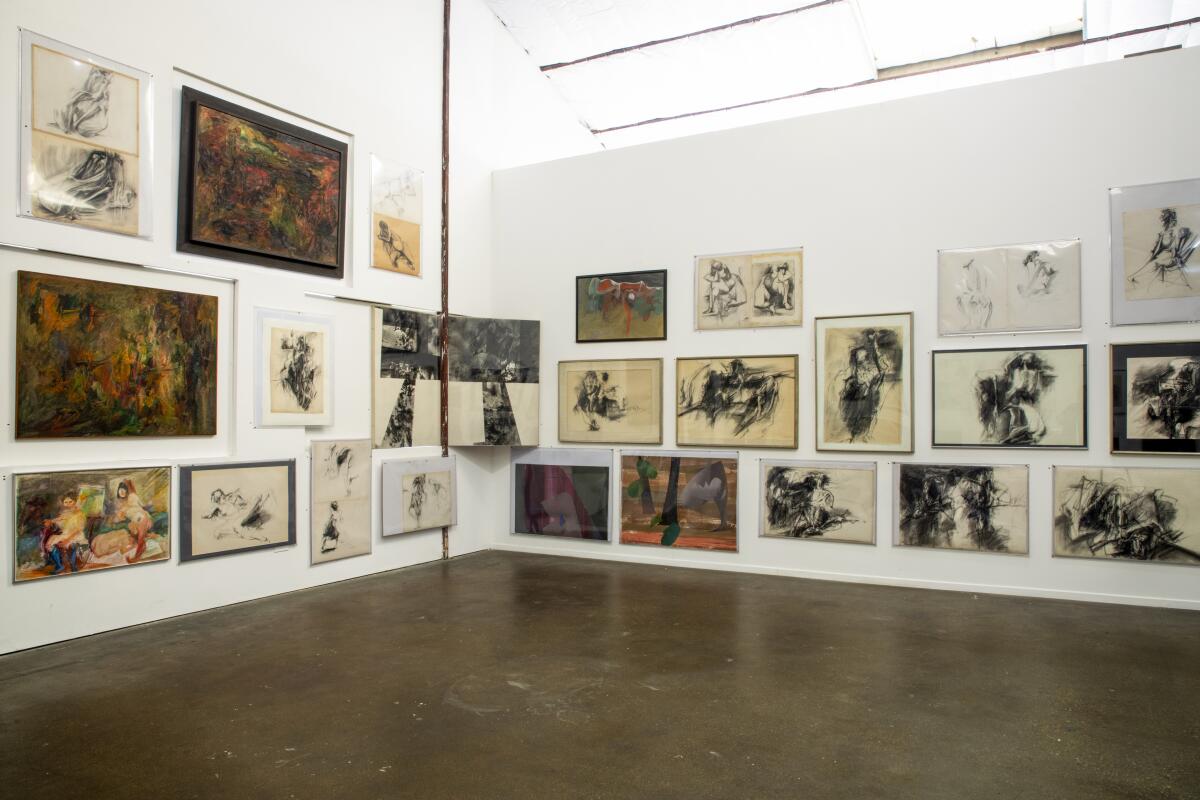
As the pandemic eases, it seems like every art space in L.A. is back up and running ... except for all of those run by the city. That may be because in recent months, the Department of Cultural Affairs has seen its management ranks depleted by numerous departures.
Essential happenings
Listings master Matt Cooper rounds up the 12 best bets for the weekend, which include performances by the Hamburg Ballet at the Music Center, a performance by Joshua Bell and the Academy of St. Martin in the Fields at the Soka Performing Arts Center in Orange County and a screening of “The Wizard of Oz” at the Hollywood Legion Theater.
I’ve been roving around hitting galleries and there are some great shows out there. At LAXART in Hollywood, Josh Kline is showing “Adaptation,” his new 16-mm film that imagines a city submerged by the rising tides of climate change. It is both unnerving and beautiful, narrated in poetic fashion by an unseen narrator: “temporary rented homes for temporary rented lives / rotting, dissolving and forgotten in the drink.”
Down the street, Deitch Los Angeles has an absolutely absorbing group show, “Luncheon on the Grass,” which features works by contemporary artists responding to Édouard Manet’s “Le Déjeuner sur l’herbe.” This includes some absolutely wild and poignant paintings by artists such as Vaughn Spann (his canvas was a favorite), Celeste Dupuy-Spencer, Nina Chanel Abney, Christina Quarles and Mickalene Thomas. On view through April 23 — do not miss.
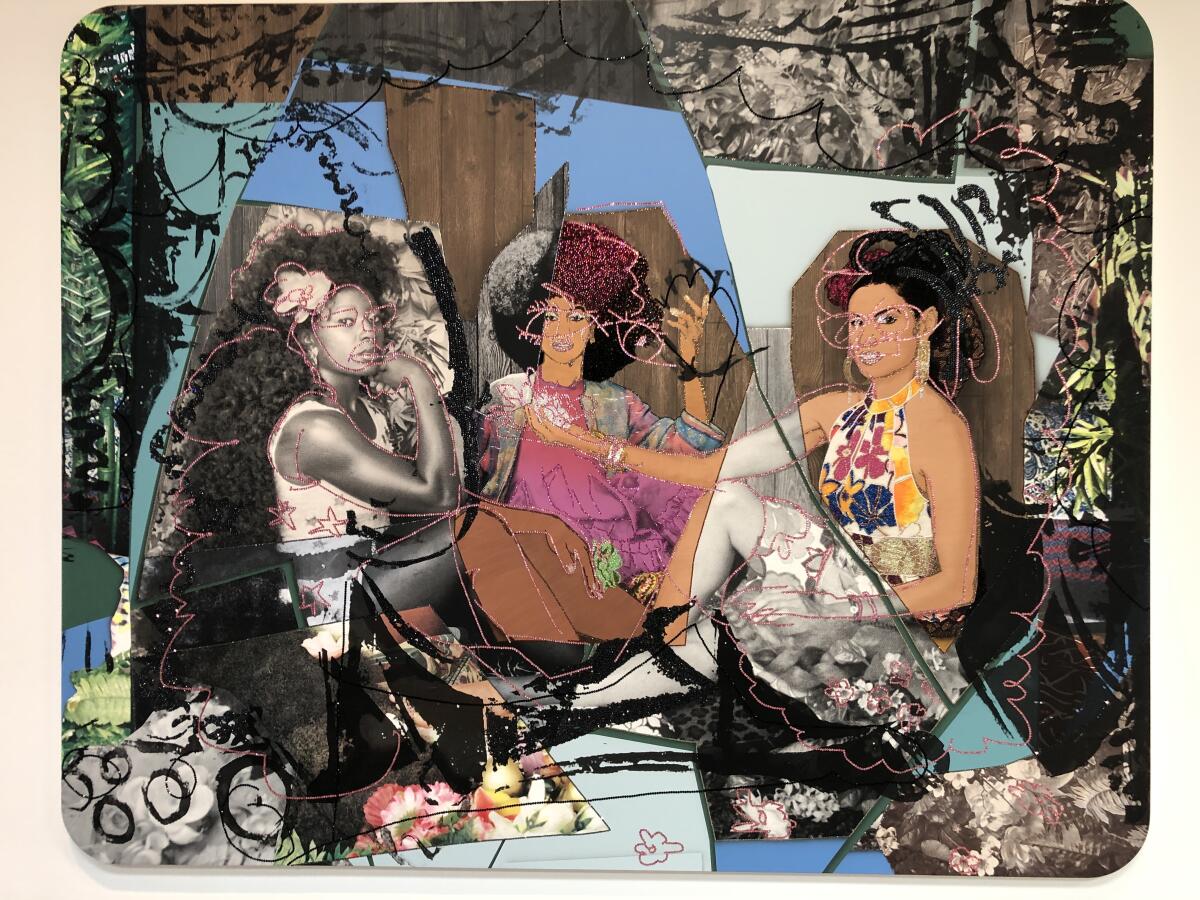
And because I’m feeling color, memory and organic forms, I was really moved by painter Carolyn Castaño‘s solo show, “Cali es Cali: Otra Version,” at the galleries at Pasadena City College. The show is spread out over the campus’s two galleries and includes a salon-style hang of paintings, drawings and found photographic images that ruminate on her family’s migration from Cali, Colombia, to Cali — as in: SoCal.
In canvases that employ incandescent palettes, Castaño evokes Colombia’s riotous natural landscapes and graphic vernaculars; a video piece juxtaposes her own family’s early home movies in the U.S. with that of a U.S. tourist’s vacation videos in Colombia — parallel journeys made for vastly different reasons. (It is compulsively watchable.) One space contains a series of plinths crafted from brilliant tile that support tropical plants. It functions as exploration, but also as elegant offering. “Cali es Cali” is on view through April 1; campus is closed this weekend due to spring break, but reopens on Monday.
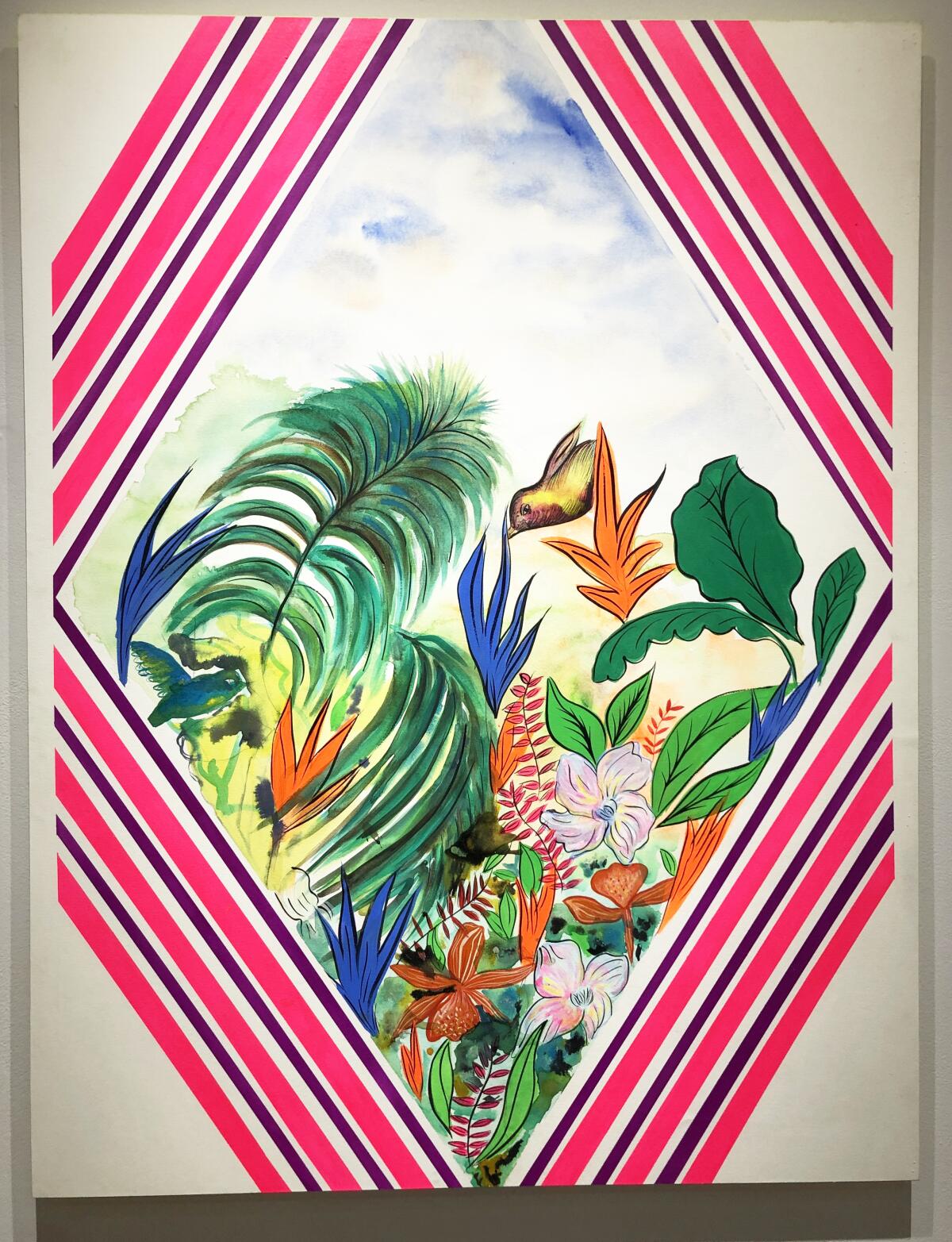
Passages
Noni Olibisi, a Los Angeles artist whose provocative murals chronicled the triumphs and agonies of Black life, including a pointed mural about police brutality that emerged in the wake of the 1992 uprising, is dead at 67. Writer Raquel Gútierrez pens an appreciation to an artist know for her “maverick ways.”
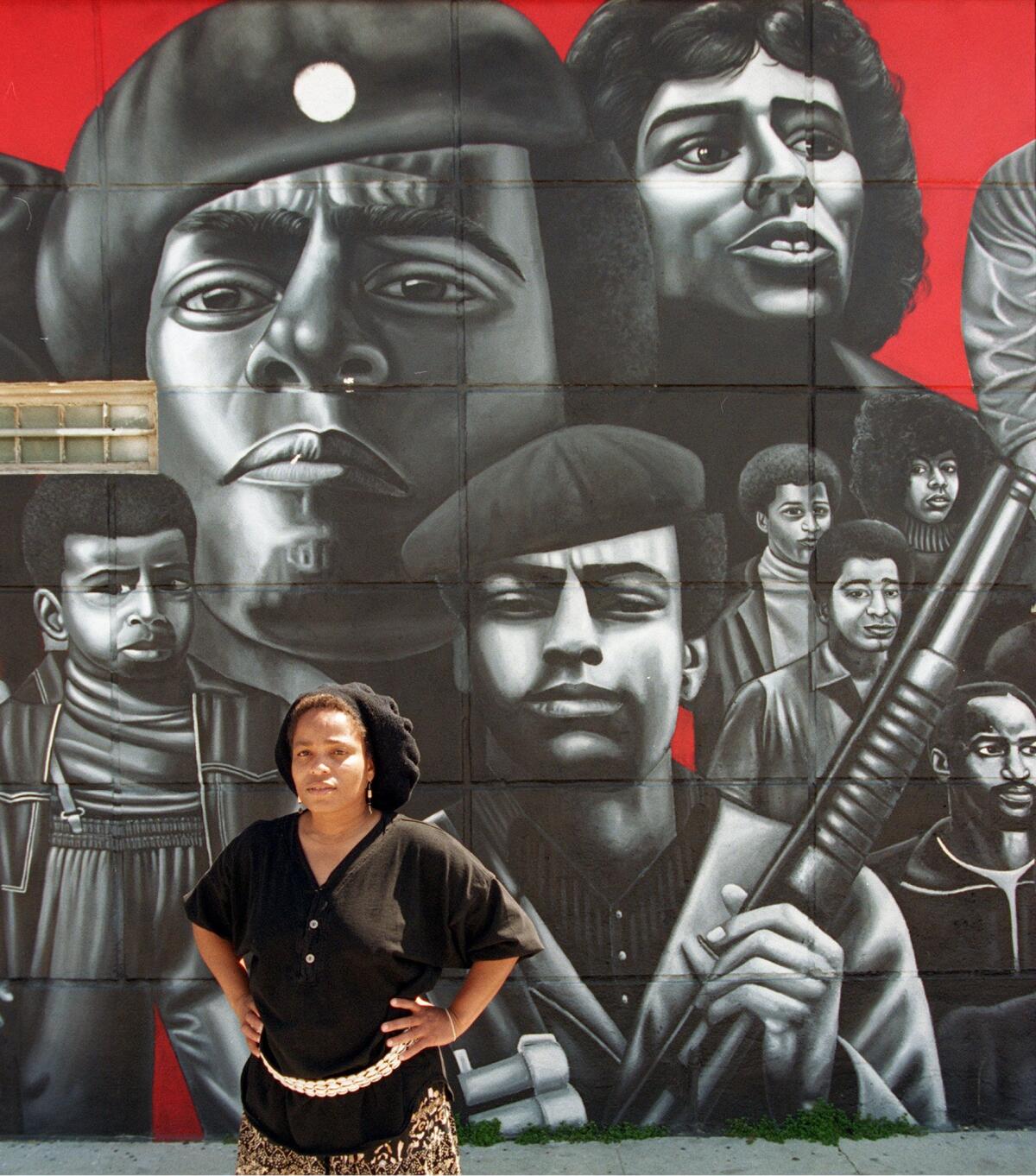
Charles Csuri, a professor of art education and computer science at the Ohio State University, whose early experiments with art and computers led him to be dubbed the “father of computer art,” is dead at 99.
Production designer Tony Walton, who claimed Tony Awards and an Oscar for his designs for musicals such as “All That Jazz,” has died at 87.
In other news
— The material origins of the Venus of Willendorf.
— Essayist Eve Babitz‘s papers have been acquired by the Huntington Library.
— The J. Paul Getty Trust has filed a lawsuit against Allianz Global Investors, claiming that the financial services firm “recklessly” mismanaged the trust’s fund, leading to about $71 million in losses.
— Since we’re on the subject of the Getty: The Getty Foundation recently made a grant of $240,000 to a Brazilian architectural archive damaged by fire.
— The pyramids at Teotihuacán in Mexico are among a new list of 25 endangered heritage sites published by the World Monuments Fund.
— Nora N. Khan has been named the new executive director of the Project X Foundation for Art and Criticism, which publishes the contemporary art journal X-TRA.
— And the Knight Foundation has announced its 2022 Arts + Tech Fellows, which include L.A. artist Mary Maggic.
— Los Angeles could soon be lifting its vaccine verification requirements at many indoor businesses — with big implications for performing arts venues.
— Pamela Anderson is making her Broadway debut next month as Roxie Hart in “Chicago.”
— Here’s what happens when oligarchs can’t buy art.
And last but not least ...
Dear U.S. media election graphics teams: May I introduce you to the magic of South Korean election graphics? They win.
The biggest entertainment stories
Get our big stories about Hollywood, film, television, music, arts, culture and more right in your inbox as soon as they publish.
You may occasionally receive promotional content from the Los Angeles Times.




